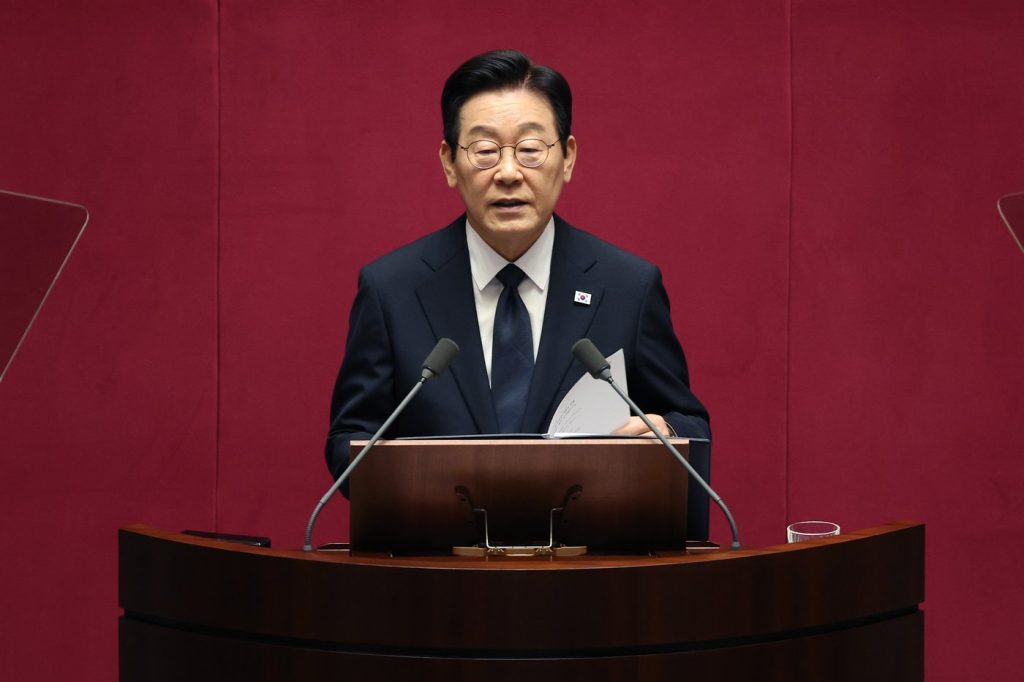SEOUL, South Korea (AP) – South Korean President Lee Jae Myung announced a significant proposal in his budget speech on Tuesday, emphasizing the need to triple government spending on artificial intelligence (AI) infrastructure and technology. This initiative aims to enhance South Korea’s capacity to compete in the evolving global landscape of AI.
In addition to the spending on AI, President Lee urged lawmakers to approve a projected 8.2% increase in defense spending for the upcoming year. He argued that this increase would be crucial for modernizing the military’s weapon systems and reducing dependence on the United States. His remarks coincided with annual security talks held in Seoul between military chiefs from both countries.
Lee's address was notable for its timing, as it followed a recent period of political turmoil, particularly a criminal investigation linked to former President Yoon Suk Yeol's controversial imposition of martial law in December. Consequently, most conservative opposition lawmakers chose to boycott Lee's speech.
During his speech at the National Assembly, Lee highlighted his successful diplomatic efforts during the recent Asia-Pacific Economic Cooperation (APEC) meetings where world leaders gathered. He considered his bilateral discussions with U.S. President Donald Trump as pivotal in alleviating uncertainties surrounding South Korea's trade, particularly regarding tariffs on automobiles and semiconductors.
Lee declared that South Korea is at a critical juncture, which he described as a time of "national survival" due to rapid global trade shifts and the transformative potential of AI. He presented a proposed government budget of 728 trillion won (approximately $506 billion), which would mark a historic high in national expenditure and would be characterized as the "first budget to open the AI era."
Specifically, the president called for an allocation of 10.1 trillion won (around $6.9 billion) for AI-focused initiatives, representing more than a threefold increase compared to the current year. The investment is intended to enhance capabilities related to AI computing and manufacturing, particularly in critical sectors such as semiconductors, automobiles, shipbuilding, and robotics.
Lee drew historical parallels between his initiatives and those of past leaders like Park Chung-hee and Kim Dae-jung, who spearheaded major infrastructure developments in South Korea during times of significant change. He stated, "We must now construct the highway for the AI era to open a future of progress and growth."
Despite the momentum around AI development, uncertainties linger regarding access to essential AI chips. Lee reassured that South Korean companies would likely have sufficient access to necessary components, referencing a deal with Nvidia, which has agreed to supply a substantial number of graphics processing units (GPUs) critical for AI infrastructure projects in South Korea. However, specific delivery timelines remain uncertain as Nvidia needs to establish data centers and power networks before fulfilling the order.
The geopolitical landscape complicates these initiatives, particularly after President Trump’s recent comments that suggested U.S. customers would have first access to Nvidia's advanced AI chips, potentially limiting availability for South Korean projects.
In terms of defense, President Lee proposed a budget of 66.3 trillion won (approximately $46 billion) for the military in the next fiscal year. The emphasis of this budget will be on modernizing weapon systems, including the integration of AI technologies, to foster greater self-reliance within the armed forces.
Lee asserted that South Korea's defense spending, which exceeds that of North Korea and ranks the country as the fifth most powerful military globally, should not rely on external entities for security. Reaffirming his discussions with Trump, Lee sought U.S. support in acquiring advanced military technologies, including nuclear-powered submarines, which Trump indicated would be facilitated through technology sharing.
As this dialogue continues, U.S. Defense Secretary Pete Hegseth and South Korean Defense Minister Ahn Gyu-back convened in Seoul for annual security consultations to discuss strategic alliance issues, including South Korea's defense spending commitments and the transition of wartime operational control to a joint command structure.











